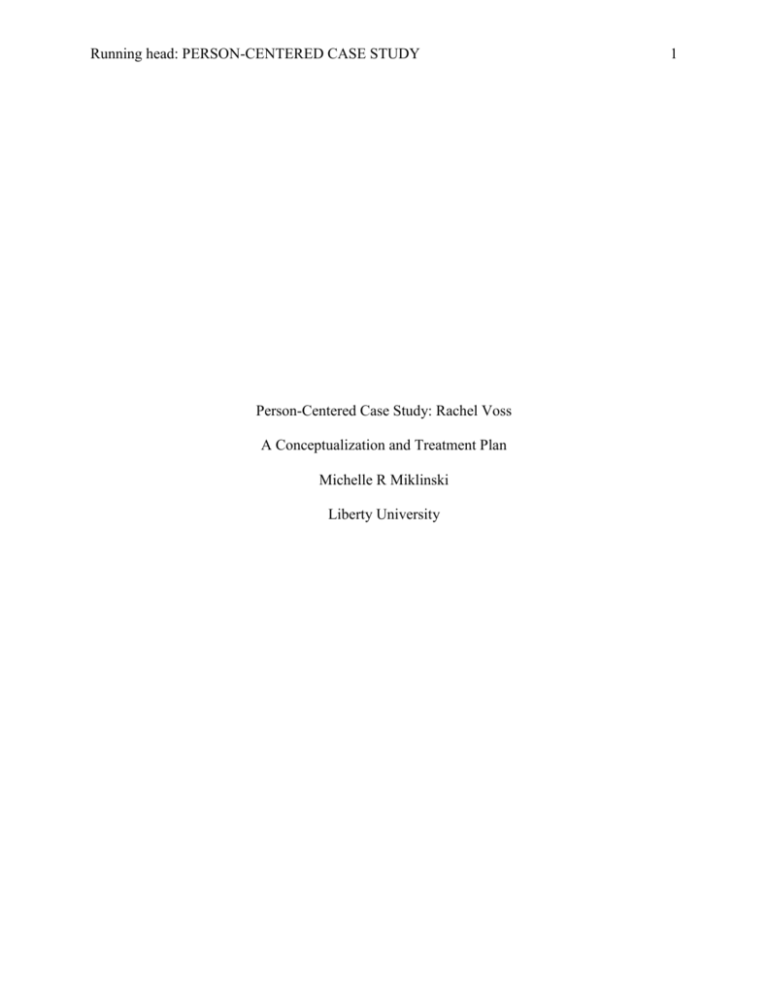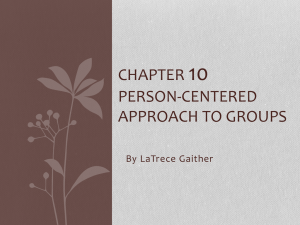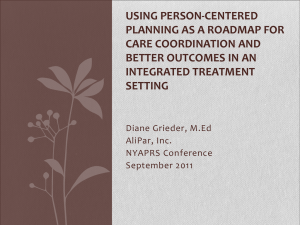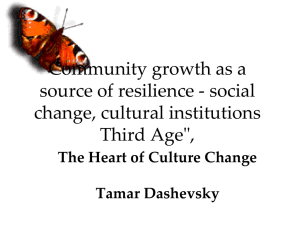Conceptualization_Treatment_Plan
advertisement

Running head: PERSON-CENTERED CASE STUDY Person-Centered Case Study: Rachel Voss A Conceptualization and Treatment Plan Michelle R Miklinski Liberty University 1 PERSON-CENTERED CASE STUDY 2 Abstract Based upon the philosophy that human beings are inherently good with an instinctual drive to attain self-actualization, Carl Rogers hypothesized that if a client is met with unconditional positive regard, empathy, and genuine concern a person will be self-directing moving towards personal awareness and growth (Murdock, 2009). Rogers felt that individuals have within themselves resources for self-understanding and for altering their self-concepts, attitudes, and self-directed behavior; these resources can be realized in the right therapeutic climate (Brodley, 2006). This case conceptualization and treatment plan presents the experiences of the client and the physiological events that are occurring due to the incongruent conditions of worth that are associated with the need for unconditional positive regard, and the perceptual lack thereof, by the external locus of evaluation internalized by the client. Goals for counseling are discussed as well as interventions that focus on helping the client discover self-awareness and new perspective. Congruence, unconditional positive regard, and empathic understanding are defined as well as the process of reflection of feeling. Qualitative researchers discuss positive outcomes associated with Roger’s core components and a summation of treatment outlook for this client is explored. Finally, challenges of treatment and active interventions that are intended to increase the client’s level of experiencing are discussed. Keywords: Carl Rogers, Person-Centered Therapy, conceptualization and treatment plan, unconditional positive regard, locus of evaluation, depression. PERSON-CENTERED CASE STUDY 3 Person-Centered Case Study: Rachel Voss A Conceptualization and Treatment Plan Person-Centered Therapy, created by Carl Rogers heralds the personal growth of a client through relationship, positive regard, and internal insight of the client (Wickman, 2003, p. 178). Based upon the philosophy that human beings are inherently good with an instinctual drive to attain self-actualization, Carl Rogers hypothesized that if a client is met with unconditional positive regard, empathy, and genuine concern a person will be self-directing moving towards personal awareness and growth (Murdock, 2009). Rogers felt that individuals have within themselves resources for self-understanding and for altering their self-concepts, attitudes, and self-directed behavior; these resources can be realized in the right therapeutic climate (Brodley, 2006). Since the subject seeking treatment is motivated toward self-development and resolution to her issues, it is the therapist’s belief that the client will benefit from this type of therapy. Presenting Concerns Rachel’s depression, anxiety, and stress presented itself after relocation to Chicago from Pennsylvania due to her husband’s employment. Both, Richard and Rachel’s families of origin continue to reside in Pennsylvania. She feels isolated and confined while withdrawing from positive community relationships, friendships, and family communication. She states that she is pulling away from relationships as a defense mechanism against hurt, loss, and rejection. A fall out with a close friend, a critical father, and a feeling of being, “stuck” in an unsatisfying lifestyle has contributed to a sense of sadness and incongruent conditions of worth. Rachel tends to use isolation and avoidance as a protective barrier which leads to a discouraging outlook on her future. Rachel feels that she has passed down her depression and social isolation to her children causing a sense of guilt, anxiety, and a lack of self-worth. Rachel’s husband is mostly PERSON-CENTERED CASE STUDY 4 absent from the home due to employment obligations. Rachel recognizes that she has power in making choices but feels helpless against her distorted view of others and of self. Rachel’s perception of others and self stem from a need to please people, while seeking affirmation, due to perceived disapproval and conditional acceptance from her parents. Rachel states that she hopes coming to counseling will help her change her perspective on her past and present experiences so that she can “get well” and move on with her life. Case Conceptualization Given the fact that Rachel has sought out counseling and is aware that incongruent experiences must be addressed and resolved is a sign that she is motivated to reach selfactualization and congruency. Signs of organismic valuing can be observed in that she is concerned for the wellbeing of herself and her children and that she knows that she must face the incongruent areas in her life that are not contributing to a positive outlook and sense of selfworth. Isolating herself from social interactions is not value enhancing and will only exacerbate her lack of self-worth and belonging. The incongruence in wanting to be safe from possible rejection through avoidance and the perception that the same avoidance is possibly contributing to that rejection is causing stress and anxiety leading to disorganization and depression. Rachel inherently sees herself as a friendly and likable person but her experiencing with some acquaintances and her parents are stifling her actualizing tendency. Her depression contributes to her lack of wellbeing in that it conflicts with her ideal self that she should be joyful and pleasant to be around at all times. Since her sense of self is conditional and not easily attained internalized incongruence causes her to avoid social interactions with family and friends. This process becomes a self fulfilling prophesy by perceiving self as a burden, in conflict with the organismic valuing process that values positive regard. PERSON-CENTERED CASE STUDY 5 Rachel’s need for positive regard is also evident in her relationship with her parents. Rachel thinks that her lack of self-worth stems from the critical interactions she experiences with her father and the ambiguous relationship she perceived with her now deceased mother. Interactions with her father causes feelings of guilt, shame, and discouragement in that she is perceived as never doing anything “right”. Rachel states that her father always begins a conversation with some type of critical remark before they can proceed with a civil conversation. These remarks have driven Rachel to reach for perfectionism in her self-actualizing, a destination that is self defeating; this external locus of evaluation is detrimental to Rachel’s internalized conditions of self-worth. Rachel is experiencing incongruence in that she has internalized a conditional self concept that is in opposition of an actualized self that she subceives deep within, the fact that she realizes this suggests that the organismic value process is still observable in Rachel’s experiences. Given an accepting environment Rachel may be open to experiencing a more genuine self, connecting with an internal locus of evaluation. In Person-Centered therapy the therapist’s unconditional positive regard corrects for the interpersonal conditional regard that originally brought about the conditions of worth ((Brodley, 2006). Without this intervention the incongruent experiences will overwhelm her leading to increased anxiety and depression resulting in disorganization and eventual breakdown. The effects of this incongruence are already observable in the isolation and avoidance being presented in social interactions. Rachel states that her depression and negative self concept keeps her from interacting with others because she feels she has nothing to contribute that will bring affirmation and approval. The ideal self believes that one must be optimistic and extroverted to be affirmed in the company of others. This incongruence causes PERSON-CENTERED CASE STUDY 6 Rachel to feel that she needs to “put on a show” whenever she makes a commitment to a social gathering with persons who she is unsure of their unconditional positive regard. The fear of criticism and uncertainty of positive regard seem to be the unconscious predictors that determine if relationships will contribute to Rachel’s sense of well-being or detract from it. Rachel’s perception of self is conditional; her experience is based on an external locus of evaluation in that she must be “perfect” or an ideal self in order to receive acceptance. Rachel’s worth and positive self-concept hinges on ideal unconditional positive regard required for self actualization by her organismic valuing process. Incongruence between her “self” and her experiences create anxiety which makes her vulnerable to stress and/or depression triggering her defense mechanisms of avoidance and isolation. It is imperative for the therapist to offer unconditional positive regard in the relationship, consistently stressing the capacity to evaluate her experiences through an internal locus of evaluation which is consistent with her actualizing tendency. Treatment Plan Goals for Counseling By providing a climate of congruence, unconditional positive regard, and empathic understanding, the goal of counseling will be to create a safe environment free of judgment so that the client can process her feelings and experiences openly, recognize them for what they are (external locus of evaluation) and being aware when they are present in social situations (Zimring & Raskin, 1992, p. 632). By embracing all aspects of herself she will be free to choose what experiences are congruent with her natural organismic valuing process and what internalized conditions of worth need to be relinquished. She will discover within herself the capacity to restructure perspective and reorganize her concept of self (Fernald, 2000, p. 175), PERSON-CENTERED CASE STUDY 7 ultimately developing an internal locus of evaluation; open to experience, trusting in oneself, and accepting the moment to moment processes occurring in her life (good or bad) as authentic expression of self and all that encompass the human experience (Murdock, 2009, p. 161). Interventions Person-Centered interventions focus on helping the client discover self-awareness and new perspectives. Through this encounter the client gains insight of themselves and the world. Techniques are not used because they suggest that the counselor knows better than the individual what direction to proceed in next (Fernald, 2000). The direction of counseling is based first and foremost on the client’s organismic experiencing which enhances the client trust in him or herself. Person-Centered therapy is a relational approach; empathy, congruence, and unconditional positive regard are not techniques rather they are human qualities (2000). The emphasis is not on what the counselor does, but who he is in the moment. (Fernald, 2000). Congruence/Genuine relationship Congruence (genuineness) refers to the consistency or matching between a counselor’s inner experiencing and their outward responses to the client (Crisp, 2011). They work to create a relationship that is both accepting and real; he does not deny his own feelings, his interaction is honest and in the moment (Crisp, 2011). Congruent counselors work to diminish any illusions their clients may have of their power and authority; they do not claim to know more about the client’s experiencing than the client, they are open about their personal limitations and are prepared to learn and appreciate the diverse cultural contexts in which their clients live (Crisp, 2000). PERSON-CENTERED CASE STUDY 8 Unconditional positive regard Unconditional acceptance allows the client to become increasingly comfortable with aspects of themselves that may be threatening, shameful, or anxiety producing which facilitates growth and eventual change (Rosenbaum, 2009). Unconditional positive regard refers to respecting the client’s experiencing in a nonjudgmental way, accepting the person regardless of their actions or ideas, and caring for the client regardless of the client’s differences from the therapist (Brodley, 2006). Unconditional positive regard is not communicated; it is primarily implied by the absence of direction, intervention, and confrontation. The therapist must develop a mindset that is free of expectation and prejudice in order to be wholly available for the client (Brodley, 2006). Empathic understanding Empathic understanding is the ability to grasp the client’s internal frame of reference, deeply connecting with the client’s subjective world. It is a consistent appreciation for the experience of the other providing acceptance and safety in which to explore painful or difficult experiences that have not been admitted into his or her self-concept. Empathy communicates the counselor’s unconditional positive regard and conveys to client that they are deeply heard. It is a process of interaction with clients. In the process, sometimes person-centered therapists deliberately communicate responses based on their own subjective experienced empathic understanding. This is done in a tentative manner and is intended to check their understanding (Brodley, 2006). PERSON-CENTERED CASE STUDY 9 Reflection of feeling Reflection, as stated by Rosenbaum (2009), helps the client to achieve a greater subjective sense of understanding. Reflective listening is not so much a matter of reflecting back a mirror image of the client as it is about altering it in subtle ways. In this manner, the therapist joins the client not only in the construction of their narrative but also helps to deepen and broaden out certain aspects of it, which the client may or may not have been aware of. Through reflective listening the therapist not only embraces the client’s subjectivity but in a manner deepens it by giving voice to other aspects of the client’s experience, which for whatever reason are not being stated (Rosenbaum, 2009). Conclusion Qualitative researchers have found that clients of Person-Centered Therapy have reported important outcomes such as, greater appreciation of vulnerability and emotional pain, as opposed to symptom relief; greater sense of empowerment and self-compassion; and better understanding of self and others (Crisp, 2011). This therapist believes that if Rachel perceives and experiences unconditional positive regard and empathic understanding from the therapist, she will be more inclined to open up and explore the incongruent experiences that are regulating her conditions of worth and stifling her self-regard. Being that Rachel is new to counseling and has not fully explored events, perceptions, and behavior, Person-Centered Therapy provides the right atmosphere for exploration of fears, anxiety producing and ambiguous events, as well as thought process that leads to depression. Person-Centered Therapy encourages client expression and release of emotion in a safe environment that is free of advice and interpretation, allowing the client to be fully vulnerable to deeper evaluations without judgment and subjective PERSON-CENTERED CASE STUDY 10 interpretations. Once Rachel becomes aware of her subjective perceptions, interpretations, and incongruence she has the option to continue working through issues of conditional self and external locus of evaluation or she may take it upon herself to apply interventions that will increase her level of experiencing. If and when techniques are introduced by the client in Person-Centered Therapy to facilitate one of their goals of therapy, the therapist will continue in his or her usual manner of being empathically responsive to the client’s interest in application yet remaining non-evaluative of it (Brodley, 2006). Challenges of treatment may include the inability of the client to recognize or interpret reasons for their behavior (Murdock, 2009), an insistence on wanting external interpretation and frustration when it is not received, the inability to loosen “stuck” feelings (Murdock, 2009), the core conditions are useful but not sufficient (Murdock, 2009). According to Murdock (2009), recent evolutions of person-centered therapy involve the use of directive or active interventions such as Process-Experiential Therapy and Cognitive Behavioral Therapy. Process-Experiential Therapy is an intervention that is non-imposing, using empathic exploration to guide activeexpression (enacting one inner experience); self reflection (reflecting on experience to make sense of it and to create new meaning); action-planning (looking ahead to how one might act, think, or feel differently in the future) (Elliott, 2007). This intervention can be used to move past old stuck places to new emergent, growth-oriented experience and productive change (Elliott, 2007). Finally, Cognitive Behavioral Therapy initially developed to treat depression, values the importance of collaborative relationship, by combining an empathic stance and a positive therapeutic alliance with the active focused treatment components of CBT (Josefowitz & Myran, 2005). Either one of these interventions are fully capable of collaborative interaction that compliments the core conditions of Person-Centered Therapy, however Person-Centered PERSON-CENTERED CASE STUDY 11 Therapy in and of itself is sufficient in producing client change and producing positive outcomes for this client. PERSON-CENTERED CASE STUDY 12 References Brodley, B. (2006). Client-initiated homework in client-centered therapy. Journal of Psychotherapy Integration, 16(2), 140-161. Crisp, R. (2011). Person-centered rehabilitation counseling: Revisiting the legacy of Carl Rogers. The Australian Journal of Rehabilitation Counseling, 17(1), 26-35. Elliott, R. (2007). The essence of process-experiential/emotion-focused therapy. American Journal of Psychotherapy, 61(3). Fernald, P. (2000, Spring). Carl Rogers: Body-centered counselor. Journal of Counseling and Development, 78(2). Josefowitz, N., & Myran, D. (2005). Towards a person-centered cognitive behavior therapy. Counselling Psychology Quarterly, 18(4), 329-336. Murdock, N. (2009). Theories of counseling and psychotherapy: A case approach. Upper Saddle River, NJ: Pearson. Rosenbaum, P. (2009, October 9). Going beyond unconditional acceptance: Carl Rogers and individual subjectivity. Retrieved from http://www.mutuallyoccluded.com Wickman, S. A. (2003, Spring). An analysis of how Carl Rogers enacted client-centered conversation with Gloria. Journal of Counseling and Development, 81(2). Zimring, F. M., & Raskin, N. J. (1992). Carl Rogers and client/person-centered therapy (p. 632). Washington, DC: American Psychological Association.









